
Journal of Material Cycles and Waste Management
Scope & Guideline
Shaping the Future of Material Sustainability
Introduction
Aims and Scopes
- Sustainable Waste Management Practices:
The journal emphasizes research on effective waste management strategies that minimize environmental impact and promote sustainability. This includes studies on municipal solid waste management, waste segregation behavior, and community-led initiatives. - Material Recovery and Recycling Technologies:
A significant focus is placed on the development and optimization of technologies for recovering valuable materials from waste streams, including metals, plastics, and organic materials. This encompasses advanced recycling methods and lifecycle assessments. - Valorization of Waste Materials:
Research on the transformation of waste into useful products is a key area, highlighting processes such as anaerobic digestion, composting, and the creation of bio-based materials. This includes studies on the physical and chemical properties of recycled materials. - Circular Economy Frameworks:
The journal supports research that develops frameworks for implementing circular economy principles in waste management, including case studies that illustrate successful applications and identify barriers to adoption. - Environmental and Economic Impact Assessments:
Papers often include analyses of the environmental benefits and economic viability of various waste management and recycling strategies, promoting a holistic view of sustainability.
Trending and Emerging
- Innovative Recycling Technologies:
There is a growing interest in exploring advanced recycling methods, such as hydrometallurgy and bioprocessing, aimed at recovering valuable metals and materials from electronic waste and other complex waste streams. - Circular Economy Practices in Urban Settings:
Research focusing on the implementation of circular economy principles in urban environments is gaining traction, with studies examining community engagement, policy impacts, and integrated waste management systems. - Biowaste Valorization:
The valorization of organic waste through processes like anaerobic digestion and composting is increasingly emphasized, reflecting a shift towards sustainable practices that convert waste into energy and soil amendments. - Behavioral Studies on Waste Separation:
Emerging themes include the psychological and sociocultural factors influencing waste separation behaviors, particularly in the context of education and community awareness initiatives. - Impact of COVID-19 on Waste Management:
The pandemic has spurred research on the implications of increased waste generation, particularly medical and plastic waste, and the adaptation of waste management practices in response to public health challenges.
Declining or Waning
- Traditional Incineration Practices:
Research on conventional incineration methods for waste disposal has decreased as the focus shifts towards more sustainable alternatives like recycling and anaerobic digestion, which are seen as more environmentally friendly. - Single-use Plastic Management:
Although still relevant, the emphasis on managing single-use plastics has waned in favor of broader discussions on circular economy practices and systemic changes in waste management. - Linear Waste Management Models:
There has been a noticeable decline in studies that advocate for linear waste management approaches, as the academic and practical focus increasingly favors circular economy strategies that prioritize reduction, reuse, and recycling. - Landfill Usage Studies:
Research specifically targeting landfill management practices has diminished, with fewer studies being published that focus exclusively on improving landfill operations compared to those exploring innovative recycling and recovery technologies.
Similar Journals
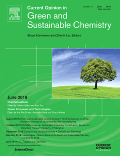
Current Opinion in Green and Sustainable Chemistry
Empowering Research for a Greener FutureCurrent Opinion in Green and Sustainable Chemistry, published by Elsevier, is a premier journal dedicated to exploring the rapidly evolving field of green and sustainable practices in chemistry. With an impressive Q1 ranking in multiple categories, including Catalysis, Process Chemistry and Technology, and Waste Management, this journal plays a pivotal role in disseminating innovative research by providing critical insights into sustainable methodologies and their implementation across various industries. The journal aims to gather leading perspectives from experts to facilitate knowledge exchange that drives the global transition towards more sustainable chemical practices. Based in the Netherlands, Current Opinion in Green and Sustainable Chemistry emphasizes high impact, evidenced by its Scopus ranks, notably achieving the 10th percentile in Environmental Science Management, making it indispensable for researchers and professionals keen on advancing sustainable chemistry solutions. This journal offers a blend of open access articles and subscription-based content, ensuring a wide reach and engagement with its audience.
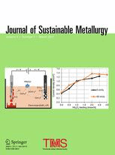
Journal of Sustainable Metallurgy
Championing eco-friendly advancements in metallurgy.Journal of Sustainable Metallurgy is a leading academic journal published by Springer, dedicated to advancing knowledge in the field of sustainable metallurgy and material sciences. With an ISSN of 2199-3823 and E-ISSN 2199-3831, this journal occupies a pivotal role in the intersection of Environmental Science, Materials Science, and Engineering, boasting a commendable impact factor and significant visibility in scholarly discussions. Operating under a Q2 category in 2023 across various rankings, including Environmental Science and Mechanics of Materials, it provides valuable insights for researchers, industry professionals, and students focusing on sustainable practices in metallurgy. The journal's aim is to disseminate high-quality research that addresses the technical challenges and innovations in material sustainability from 2015 to 2024. Through robust peer-review processes, it ensures the dissemination of rigorous research, fostering an informed dialogue within the global materials community. For those interested in open access options, please refer to the publisher's website for more information.
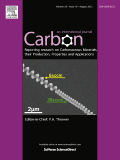
CARBON
Connecting Researchers in Chemistry and Materials ScienceCARBON is a leading peer-reviewed journal published by PERGAMON-ELSEVIER SCIENCE LTD, focusing on the realms of Chemistry and Materials Science. With an impressive impact factor, CARBON is ranked within the top quartile (Q1) of both fields in the 2023 Scimago Journal Rank, remarkably securing the 18th position out of 463 in General Materials Science and the 22nd position out of 408 in General Chemistry. Since its inception in 1963, the journal has been dedicated to publishing high-quality research that advances the understanding of carbon-based materials and their applications. Operating from the United Kingdom, CARBON provides an essential platform for researchers, professionals, and students alike to disseminate their findings and innovations. Although not an open-access journal, it offers access options that maintain the integrity and high standards of academic publishing. As a critical resource in its field, CARBON continues to foster scientific dialogue and development, significantly impacting current and future research.
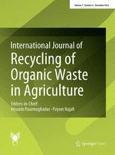
International Journal Of Recycling of Organic Waste in Agriculture
Advancing Agricultural Practices through Waste RecyclingInternational Journal of Recycling of Organic Waste in Agriculture is a pioneering open-access journal, established in 2012 and published by the Islamic Azad University, Isfahan-Khorasgan Branch, Iran. With ISSN 2195-3228 and E-ISSN 2251-7715, this journal focuses on innovative research and development in the field of organic waste recycling within agricultural contexts. As indicated by its latest metrics, it holds a respectable ranking in the Q2 quartile in Agricultural and Biological Sciences and Q3 in Waste Management and Disposal for 2023. This positions the journal as a valuable resource for professionals, researchers, and students invested in sustainable agricultural practices and waste management strategies. With its commitment to advancing knowledge and fostering interdisciplinary dialogue, the journal serves as an essential platform for disseminating significant findings that can positively impact environmental sustainability and agricultural productivity worldwide.
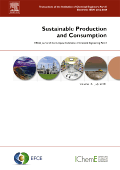
Sustainable Production and Consumption
Transforming Research into Sustainable ActionWelcome to Sustainable Production and Consumption, a premier journal published by Elsevier in the vibrant field of sustainability and environmental science. With an ISSN of 2352-5509, this journal has established itself as a leading platform for innovative research and discourse on sustainable manufacturing, consumption practices, and environmental technologies. As evidenced by its impressive 2023 rankings—Q1 in Environmental Chemistry, Environmental Engineering, Industrial and Manufacturing Engineering, and Renewable Energy, Sustainability and the Environment—the journal ranks among the top tier of its field. Researchers and professionals alike are invited to explore the journal’s rigorous peer-reviewed articles, which aim to advance the understanding and implementation of sustainable practices across various industries. With a strong commitment to disseminating impactful research, Sustainable Production and Consumption serves as an essential resource for academics, policy makers, and industry leaders seeking to address the challenges of modern environmental sustainability.

International Journal of Environmental Science and Technology
Bridging science and technology for a greener tomorrow.International Journal of Environmental Science and Technology, published by SPRINGER, stands as a premier platform for the dissemination of cutting-edge research in the fields of environmental science, technology, and engineering. With an impressive scope spanning from 2005 to 2024, this journal serves as a vital resource for academic and professional communities engaged in tackling pressing environmental challenges. It boasts a strong reputation, evidenced by its Q1 ranking in Agricultural and Biological Sciences and solid placements in Environmental Chemistry and Engineering. Researchers searching for high-impact studies will find the journal's contributions significant, as reflected in its rankings within Scopus: 34th percentile in Agricultural and Biological Sciences and notable standings in Environmental Engineering and Chemistry. Although the journal is not currently an Open Access resource, it maintains a commitment to academic rigor and innovation, making it indispensable for those devoted to advancing knowledge in environmental sustainability and technology.
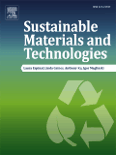
Sustainable Materials and Technologies
Transforming Materials Science for Sustainable SolutionsSustainable Materials and Technologies is an esteemed journal published by Elsevier, focusing on pioneering research and innovative solutions in the fields of industrial engineering, materials science, and environmental sustainability. With a prestigious Q1 ranking in multiple relevant categories—including Industrial and Manufacturing Engineering, Materials Science, Renewable Energy, Sustainability, and Waste Management—this journal is positioned as a leading platform for disseminating high-impact research that addresses pressing challenges in material sustainability. Recognized for its rigorous peer-review process and commitment to academic excellence, Sustainable Materials and Technologies is dedicated to providing open access to groundbreaking studies and practical methodologies that drive forward the agenda for a sustainable future. Since its inception in 2014, the journal has been integral for professionals, researchers, and students who are engaged in the quest for innovative materials and technologies that minimize ecological footprints. Join a community at the forefront of sustainability science by contributing to and engaging with the transformative research published in this pivotal journal.

RUSSIAN METALLURGY
Illuminating the Path of Metallurgical ExcellenceRUSSIAN METALLURGY is a distinguished journal published by PLEIADES PUBLISHING INC, focusing on the fields of metals and alloys. With an ISSN of 0036-0295 and an E-ISSN of 1555-6255, this journal serves as a vital resource for researchers and practitioners alike, offering insights into the latest advancements and innovative research within the metallurgy domain. Recognized in a competitive landscape, it holds a Q3 ranking in the Metals and Alloys category as of 2023, reflecting its commitment to rigorous scientific dissemination. The journal spans a significant historical timeline of research since its inception in 1984, with aims to advance the knowledge and application of metallurgical science. Although currently not open access, it remains crucial for those aiming to stay current in the dynamic field of materials science. RUSSIAN METALLURGY fosters a deeper understanding of the physical and chemical properties of metals, guiding future innovations in industry and academia.

Recycling
Connecting researchers to foster environmental innovation.Recycling is a renowned international open access journal published by MDPI that has been dedicated to advancing the field of recycling and waste management since its inception in 2015. With a focus on innovative technologies, management practices, and policy frameworks, this journal serves as a platform for researchers, professionals, and students who are eager to explore sustainable solutions in resource recovery and material efficiency. Based in beautiful Basel, Switzerland, Recycling boasts an impressive impact with a 2023 ranking of Q2 in Management, Monitoring, Policy and Law and Q1 in Materials Science (Miscellaneous), signifying its pivotal role in driving forward-thinking research in these critical areas. The journal is indexed in Scopus, with strong performance metrics highlighting its relevance and quality, such as a rank of #42 in Waste Management and Disposal. As an open access publication, Recycling promotes the dissemination of knowledge, ensuring that groundbreaking research is freely available to a global audience. Whether you are a seasoned researcher or a student eager to contribute to the discourse surrounding sustainable practices, Recycling provides a vital resource for those committed to the future of waste management and environmental sustainability.

JOURNAL OF THE AMERICAN LEATHER CHEMISTS ASSOCIATION
Bridging theory and practice in leather chemistry.JOURNAL OF THE AMERICAN LEATHER CHEMISTS ASSOCIATION, published by the American Leather Chemists Association, serves as a cornerstone for research and development in the leather industry. With an ISSN of 0002-9726, this journal has been disseminating valuable findings since its first publication in the late 1960s, continuing through 2024. Despite being categorized within the Q4 quartile in fields such as Chemical Engineering, Chemistry, and Materials Science, it plays a crucial role in fostering innovation and addressing challenges faced by professionals in leather chemistry and technology. Researchers and practitioners alike will find an array of studies and discussions that bridge theoretical research and practical applications. Although not an open-access journal, it prioritizes accessibility and aims to keep pace with emerging trends in leather science, ensuring that it remains relevant in an evolving marketplace. Whether you are a seasoned professional or a budding student, this journal is indispensable for advancing your understanding of leather chemistry.